
An uprated camera is equipped with a 1-inch 20-megapixel sensor capable of shooting 4K/60 fps video and Burst Mode stills at 14 fps. The FlightAutonomy system includes five vision sensors for 2-directional obstacle sensing and forward-vision obstacle avoidance. The adoption of titanium alloy and magnesium alloy increasesthe rigidity of the airframe and reduces weight, making the Phantom 4 Advanced even lighter than the Phantom 4.
1-inchImage Sensor

60 fps

Mechanical Shutter

Dual Coding

4.3mi (7km) Long-range Control

30-minuteFlight Time

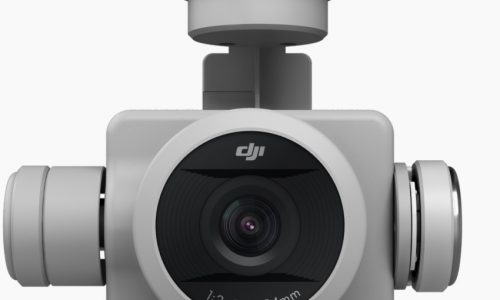
CAMERA WITH 1-INCH 20MP SENSOR
The onboard camera is equipped with a 1-inch 20-megapixel CMOS sensor. A mechanical shutter is used to eliminate rolling shutter distortion, which can occur when taking images of fast-moving subjects or when flying at high speeds. In effect, it is as powerful as many professional cameras. More powerful video processing supports H.264 4K videos at 60 fps or H.265 4K at 30 fps, both with a 100Mbps bitrate. Excellent optical performance, sensors, and processors ensure everything is captured with high dynamic range and more image detail needed for advanced post-production.
The Phantom 4 Advanced’s camera system improves upon everything that made the original Phantom 4 so iconic. Every aspect has been significantly upgraded, including the sensor size, resolution, and image processing system, making it the most powerful Phantom to date. Users can also adjust aperture from f2.8-11 for more versatile imaging.
1-INCH 20-MEGAPIXEL CMOS
Sensor size is more important to image quality than the number of pixels because a larger sensor captures more information in every pixel, improving
dynamic range, signal-to-noise ratio, and low light performance. The 1-inch 20-megapixel CMOS sensor in the Phantom 4 Advanced is almost four times
the size of the Phantom 4’s 1/2.3in sensor. It uses larger pixels and has a maximum ISO of 12800 as well as increased contrast. It is good enough for
images to be used immediately, while also capturing enough detail for advanced post-processing.
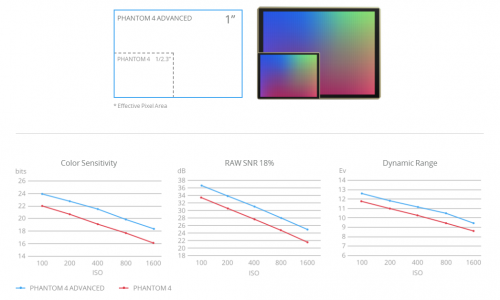
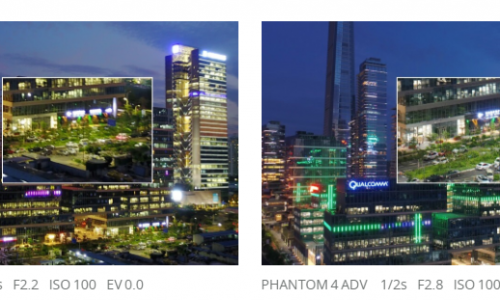
IMAGE COMPARISONS
PROFESSIONAL 4K VIDEO
An enhanced video processing system allows video to be captured in cinema and production optimized DCI 4K/60 (4096 x 2160/60 fps) at a bitrate of 100 Mbps,
enabling you to get high-resolution slow motion shots. The Phantom 4 Advanced also supports the H.265 video codec (maximum resolution 4096X2160/30 fps).
For a given bitrate, H.265 doubles the amount of image processing as H.264, resulting in significantly enhanced image quality. Recording in high dynamic range
D-log makes the most of image data for color grading.
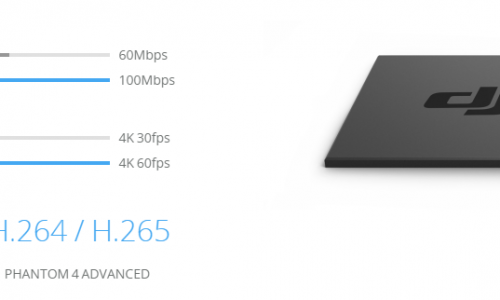

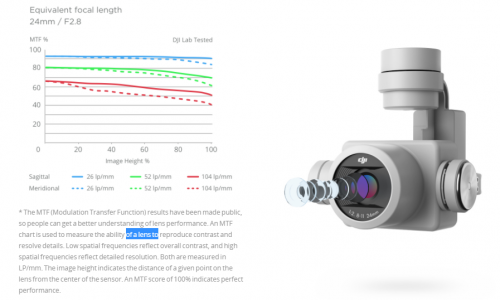
HIGH RESOLUTION LENS
The resolution and contrast of a lens is critical to image quality, because only a quality lens can capture sharp, vivid photos at high resolutions.
The brand new Phantom 4 Advanced camera has an aerial optimized F2.8 wide-angle lens with a 24 mm equivalent focal length. It features eight
elements – two aspherical – arranged in seven groups that fit into a smaller, more compact frame. Its images are consistently detailed with
low distortion and dispersion, ensuring that photos and videos are sharp and vivid.
CAPTURE EVERY MOMENT
Aerial imaging is not only used to capture landscapes but also to bring about new perspectives. For example, when filming action scenes or motor racing,capturing objects moving at high speeds has always been a challenge for flying cameras using electronic shutters. The Phantom 4 Advanced uses a mechanicalshutter and a large-aperture prime lens. A mechanical shutter with a maximum speed of 1/2000s eliminates rolling shutter distortion which can occur when takingimages of fast moving subjects, or when flying at high speeds. The electronic shutter has also been improved with a maximum shutter speed of 1/8000s.A new Burst Mode is capable of shooting 14 fps at 20-megapixels, all for catching the perfect moment.
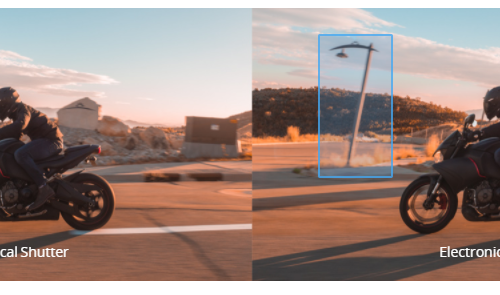
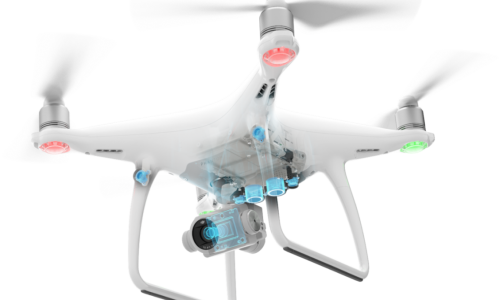
5 VISION SENSORS
Equipped with DJI’s FlightAutonomy system made up of five vision sensors, dual-band satellite positioning (GPS and GLONASS), ultrasonic rangefinders,and redundant sensors, the Phantom 4 Advanced can hover precisely in places without GPS and navigate complex environments. The dual forwardvision sensors can see as far as 30 m out in front, enable auto brake, and hover or detour in front of obstacles within a 15-meter range.
REMOTE CONTROLLER WITH BUILT-IN SCREEN
The Phantom 4 Advanced+ comes equipped with the upgraded Lightbridge HD video transmission system, which has a maximum
video transmission range of 4.3 mi (7 km). * A 5.5-inch 1080p screen integrated with the Phantom 4 Advanced+ offers 1000 cd/m2 of brightness,
more than twice as bright as conventional smart devices, enabling clear visibility in direct sunlight. With a five-hour battery life, the Phantom 4 Advanced+
is a powerful aerial imaging solution. The built-in DJI GO 4 app allows you to live stream, edit, and share your aerial videos and photos instantly.
*Unobstructed, free of interference, when FCC compliant.
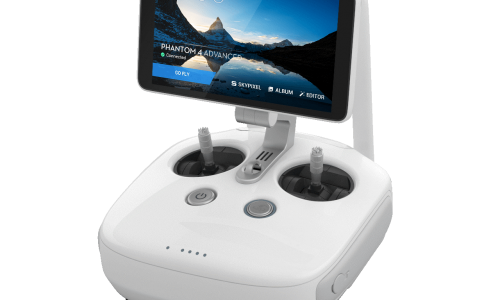
INTELLIGENT FLIGHT
- Draw
Draw is a brand new technology for waypoint control. Simply draw a route on the screen and the Phantom 4 Advanced will move in that direction while keeping its altitude locked. This allows the pilot to focus on camera control and enables more complex shots. There are two Draw modes that can be used in different scenarios.
Forward: The aircraft follows the route at a constant speed with the camera facing in the direction of flight.
Free: The aircraft only moves along the route when instructed. In this mode, the camera can face any direction during a flight.
- ActiveTrack
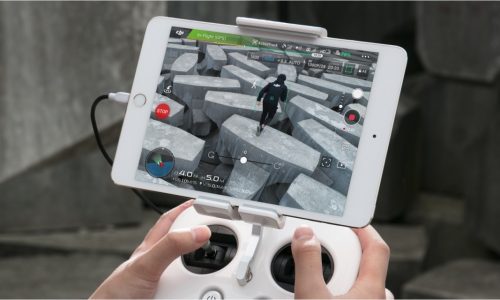
Following fast-moving objects can be very challenging. However, superior image recognition algorithms used by the Phantom 4 Advanced allow it to recognize and track an object while keeping it in frame. This new algorithm also recognizes a broad range of subjects, from people, vehicles, and animals, and will adjust its flight dynamics accordingly for smoother shots.
Pilots can now choose between:
Trace – Follow behind or in front of a subject, avoiding obstacles automatically.
Profile – Fly alongside a subject at a variety of angles to get profile shots of the subject.
Spotlight – Keep the camera trained on a subject while the aircraft flies almost anywhere.
- TapFly
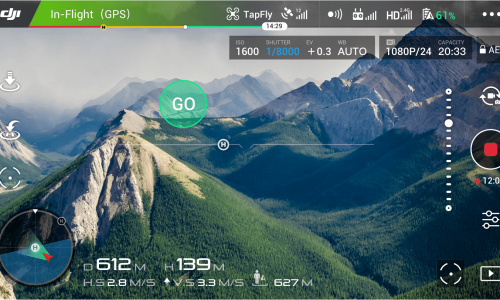
Fly in any direction visible on-screen with a simple tap. Tap anywhere on the screen to smoothly adjust the direction of flight while automatically avoiding obstacles *. Tap the screen again or use the control sticks to change direction. A new AR route function shows the aircraft’s real-time flight direction for reference. It can be difficult to control altitude, course, speed, and camera pitch simultaneously using the control sticks. TapFly Free allows a pilot to set the direction of flight, allowing them to turn the Phantom 4 Advanced or tilt the gimbal as required without changing flight direction. In total, there are now two TapFly modes:
TapFly Forward – Tap to fly in the selected direction.
- Return to Home
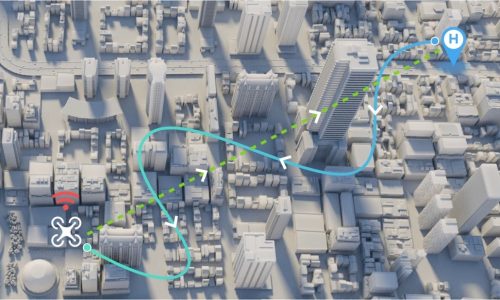
Fly in any direction visible on-screen with a simple tap. Tap anywhere on the screen to smoothly adjust the direction of flight while automatically avoiding obstacles *. Tap the screen again or use the control sticks to change direction. A new AR route function shows the aircraft’s real-time flight direction for reference. It can be difficult to control altitude, course, speed, and camera pitch simultaneously using the control sticks. TapFly Free allows a pilot to set the direction of flight, allowing them to turn the Phantom 4 Advanced or tilt the gimbal as required without changing flight direction. In total, there are now two TapFly modes:
TapFly Forward – Tap to fly in the selected direction.
TapFly Free – Lock the forward direction of the Phantom without locking the camera direction allowing it to turn as it flies.
*Obstacle Avoidance is not available with TapFly Free.
TapFly Free – Lock the forward direction of the Phantom without locking the camera direction allowing it to turn as it flies.
*Obstacle Avoidance is not available with TapFly Free.
- Gesture Mode
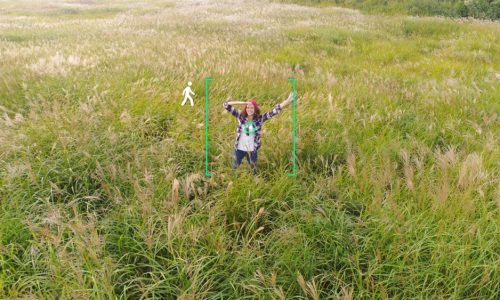
Using Gesture Mode, selfies can be captured easily using a few gestures. Advanced computer vision technology allows the Phantom 4 Advanced to follow instructions through gestures. To take a picture in Gesture Mode, a person simply lifts their arms when facing the camera. The aircraft will recognize this movement by locking on to them, placing the person in the middle of the frame. When ready for a photo, the person holds their arms out to signal the aircraft. A three second countdown will begin, enough time to strike a pose. Now all these moments can be captured without a remote controller in sight.
FLIGHT PERFORMANCE
- Flight Modes
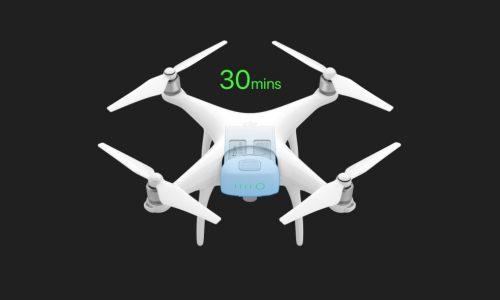
The Phantom 4 Advanced is able perform optimally in different situations depending on requirements. There are three main flight modes: Position, Sport and Atti. In P-Mode, TapFly, ActiveTrack, obstacle sensing, and GPS positioning are available. S-Mode adds extra agility and higher speed, reaching 45 mph (72 kph). A-Mode switches off satellite stabilization and holds the Phantom 4 Advanced’s altitude, ideal for experienced pilots looking to capture smoother footage.
Tripod Mode, which limits speed to 4 mph (7 kph) provides precision control for fine framing and indoor flying.
- Sensor Redundancy
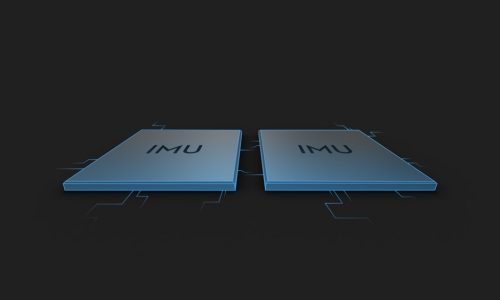
The Phantom 4 Advanced features dual compass modules and dual IMUs. Compasses and IMUs are important sensors that ensure stability and reliability during flight. The Phantom 4 Advanced constantly compares the data it receives through both pairs of sensors. This data runs through advanced algorithms, and any inaccurate data is simply discarded without affecting flight.
- Intelligent Batteries
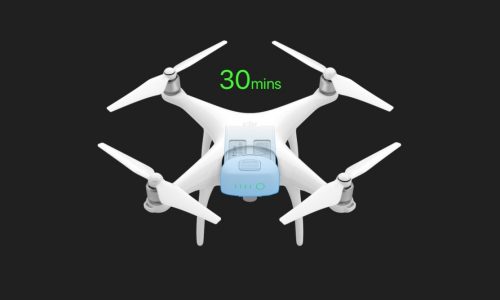
Professional aerial imaging benefits from longer flight times. The Phantom 4 Advanced has a maximum flight time of 30 minutes, offering more time in the air to capture the perfect shot. The DJI GO 4 app shows battery life and calculates remaining flight time according to distance traveled and more. It will sound alerts when it reaches the minimum battery level required to return home safely. Its advanced battery management system prevents overcharging and over-discharging. When in long term storage, batteries will automatically discharge to maintain optimum longevity.
- DJI Go 4
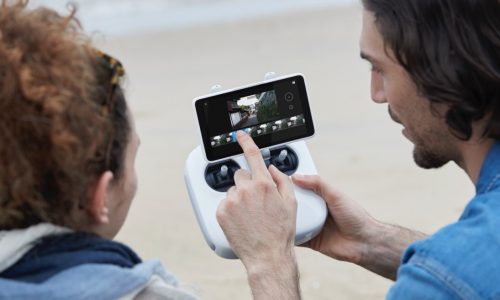
When using the DJI GO 4 app, a large number of intelligent flight modes are available. It also provides access to full manual camera controls, including ISO, aperture, shutter speed, image formats, and more. Any changes in DJI GO 4 will appear almost instantly on screen. Vital flight data and video transmission status are easy to check in app, further enhancing control efficiency and convenience.
SPECS
AIRCRAFT
| Weight (Battery & Propellers Included) | 1368 g |
| Diagonal Size (Propellers Excluded) | 350 mm |
| Max Ascent Speed | S-mode: 6 m/s P-mode:5 m/s |
| Max Descent Speed | S-mode:4 m/s P-mode:3 m/s |
| Max Speed | S-mode: 45 mph (72 kph) A-mode: 36 mph (58 kph) P-mode: 31 mph (50 kph) |
| Max Tilt Angle | S-mode:42° A-mode:35° P-mode:25° |
| Max Angular Speed | S-mode: 250°/s A-mode: 150°/s |
| Max Service Ceiling Above Sea Level | 19685 feet (6000 m) |
| Max Wind Speed Resistance | 10 m/s |
| Max Flight Time | Approx. 30 minutes |
| Operating Temperature Range | 32° to 104°F (0° to 40°C) |
| Satellite Positioning Systems | GPS/GLONASS |
| Hover Accuracy Range | Vertical: ±0.1 m (with Vision Positioning) ±0.5 m (with GPS Positioning) Horizontal: ±0.3 m (with Vision Positioning) ±1.5 m (with GPS Positioning) |
GIMBAL
| Stabilization | 3-axis (pitch, roll, yaw) |
| Controllable Range | Pitch: -90° to +30° |
| Max Controllable Angular Speed | Pitch: 90°/s |
| Angular Vibration Range | ±0.02° |
VISION SYSTEM
| Vision System | Forward Vision System Downward Vision System |
| Velocity Range | ≤31 mph (50 kph) at 6.6 ft (2 m) above ground |
| Altitude Range | 0 – 33 feet (0 – 10 m) |
| Operating Range | 0 – 33 feet (0 – 10 m) |
| Obstacle Sensory Range | 2 – 98 feet (0.7 – 30 m) |
| FOV | Forward: 60°(Horizontal), ±27°(Vertical) Downward: 70°(Front and Rear), 50°(Left and Right) |
| Measuring Frequency | Forward: 10 Hz Downward: 20 Hz |
| Operating Environment | Surface with clear pattern and adequate lighting (lux>15) |
CAMERA
| Sensor | 1’’ CMOS Effective pixels: 20M |
| Lens | FOV 84° 8.8 mm/24 mm (35 mm format equivalent) f/2.8 – f/11 auto focus at 1 m – ∞ |
| ISO Range | Video: 100 – 3200 (Auto) 100 – 6400 (Manual) Photo: 100 – 3200 (Auto) 100- 12800 (Manual) |
| Mechanical Shutter Speed | 8 – 1/2000 s |
| Electronic Shutter Speed | 8 – 1/8000 s |
| Image Size | 3:2 Aspect Ratio: 5472 × 3648 4:3 Aspect Ratio: 4864 × 3648 16:9 Aspect Ratio: 5472 × 3078 |
| PIV Image Size | 4096×2160(4096×2160 24/25/30/48/50p) 3840×2160(3840×2160 24/25/30/48/50/60p) 2720×1530(2720×1530 24/25/30/48/50/60p) 1920×1080(1920×1080 24/25/30/48/50/60/120p) 1280×720(1280×720 24/25/30/48/50/60/120p) |
| Still Photography Modes | Single Shot Burst Shooting: 3/5/7/10/14 frames Auto Exposure Bracketing (AEB): 3/5 bracketed frames at 0.7 EV Bias Interval: 2/3/5/7/10/15/20/30/60 s |
| Video Recording Modes | H.265 C4K:4096×2160 24/25/30p @100Mbps 4K:3840×2160 24/25/30p @100Mbps 2.7K:2720×1530 24/25/30p @65Mbps 2.7K:2720×1530 48/50/60p @80Mbps FHD:1920×1080 24/25/30p @50Mbps FHD:1920×1080 48/50/60p @65Mbps FHD:1920×1080 120p @100Mbps HD:1280×720 24/25/30p @25Mbps HD:1280×720 48/50/60p @35Mbps HD:1280×720 120p @60Mbps |
H.264
C4K:4096×2160 24/25/30/48/50/60p @100Mbps
4K:3840×2160 24/25/30/48/50/60p @100Mbps
2.7K:2720×1530 24/25/30p @80Mbps
2.7K:2720×1530 48/50/60p @100Mbps
FHD:1920×1080 24/25/30p @60Mbps
FHD:1920×1080 48/50/60 @80Mbps
FHD:1920×1080 120p @100Mbps
HD:1280×720 24/25/30p @30Mbps
HD:1280×720 48/50/60p @45Mbps
HD:1280×720 120p @80MbpsMax Video Bitrate100 MbpsSupported File SystemsFAT32 (≤32 GB); exFAT (>32 GB)PhotoJPEG, DNG (RAW), JPEG + DNGVideoMP4/MOV (AVC/H.264; HEVC/H.265)Supported SD CardsMicro SD
Max Capacity: 128GB
Write speed ≥15MB/s, Class 10 or UHS-1 rating requiredOperating Temperature Range32° to 104°F (0° to 40°C)
INTELLIGENT FLIGHT BATTERY
| Capacity | 5870 mAh |
| Voltage | 15.2 V |
| Battery Type | LiPo 4S |
| Energy | 89.2 Wh |
| Net Weight | 468 g |
| Charging Temperature Range | 41° to 104°F (5° to 40°C) |
| Max Charging Power | 160 W |
CHARGER
| Voltage | 17.5V |
| Rated Power | 100 W |
APP / LIVE VIEW
| Mobile App | DJI GO 4 |
| Live View Working Frequency | 2.4 GHz ISM |
| Live View Quality | 720P @ 30fps |
| Latency | Phantom 4 Advanced: 220 ms (depending on conditions and mobile device) Phantom 4 Advanced +:160 – 180 ms |
| Required Operating Systems | iOS 9.0 or later Android 4.4.0 or later |

